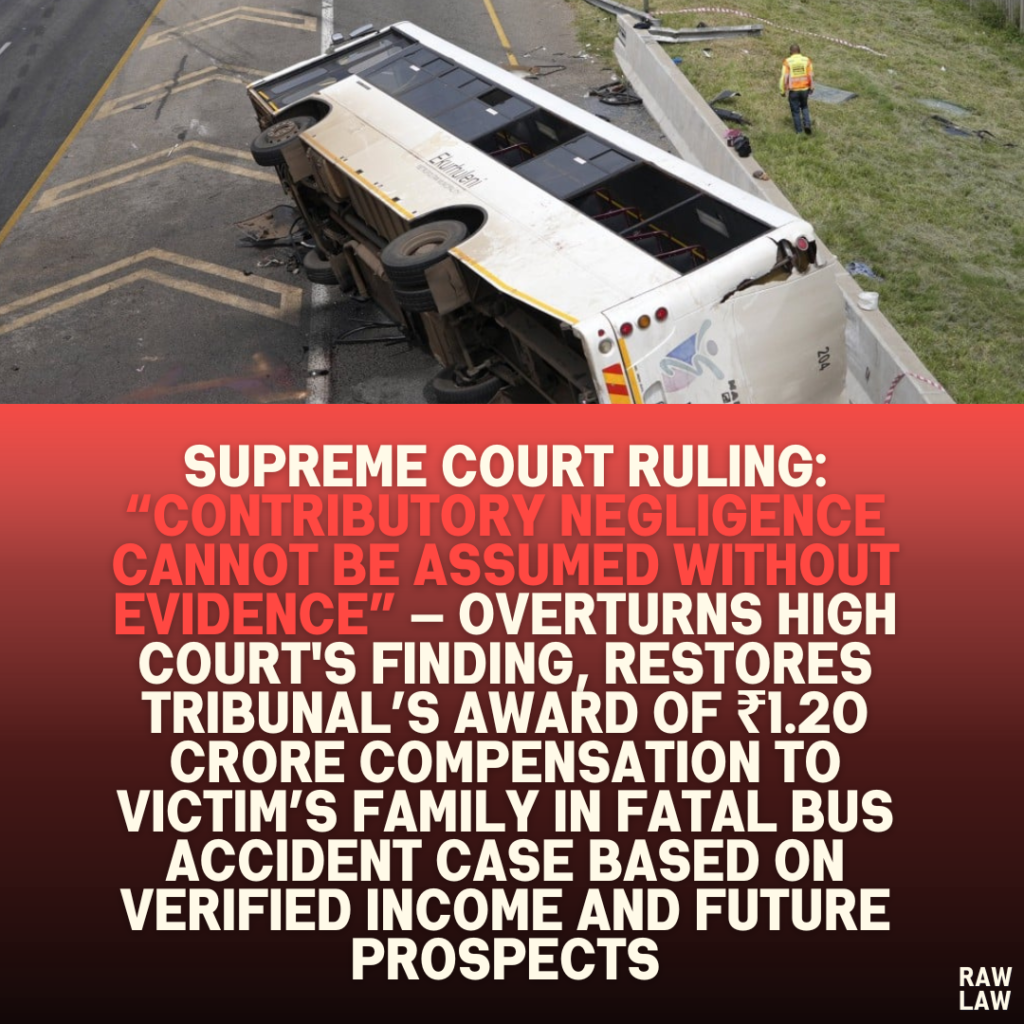Court’s Decision
The Supreme Court allowed the appeal and set aside the High Court’s finding of 25% contributory negligence on the part of the deceased. The Court restored the finding of the Tribunal that the accident was solely due to the rash and negligent driving of the bus driver. The Court also revised the compensation amount, assessing the deceased’s monthly income at ₹62,725/- per month and awarding a total compensation of ₹1,20,84,925/- with interest as awarded by the Tribunal.
Facts
On June 6, 2016, the deceased, aged 38, was riding his motorcycle when he was hit by a city bus that was being driven rashly and negligently. The accident led to the immediate death of the deceased. His dependents subsequently filed a claim for compensation amounting to ₹3,00,00,000/-, asserting that the deceased was the sole earning member of the family and was earning ₹70,000/- per month as an Executive in a housekeeping department.
Issues
- Whether the deceased was partly responsible for the accident (contributory negligence).
- Whether the compensation awarded by the Tribunal was just and proper.
- Whether the High Court was correct in reducing the assessed monthly income of the deceased.
- Whether the interest awarded by the Tribunal was excessive.
Petitioner’s Arguments
- The Tribunal correctly found that the accident occurred solely due to the rash and negligent driving of the bus driver.
- The High Court erred in attributing 25% contributory negligence to the deceased despite a lack of evidence.
- The High Court’s assessment of the deceased’s income at ₹50,000/- per month was incorrect, as the last drawn salary as per bank records was ₹70,000/- per month.
- The High Court incorrectly reduced the compensation amount without sufficient justification.
Respondent’s Arguments
- The High Court was correct in holding that the deceased was partially responsible for the accident as he was riding at a high speed.
- The compensation awarded by the Tribunal was excessive and should be reconsidered.
- The interest rate of 9% per annum was too high and should be lowered.
Analysis of the Law
The Supreme Court emphasized that in motor accident compensation cases, the burden of proof follows the “preponderance of probability” rather than strict criminal standards. The Court reiterated that in the absence of direct evidence, it cannot be presumed that both parties contributed to the accident merely because they were moving at high speed.
The Court relied on precedents, stating that the Motor Vehicles Act is a beneficial piece of legislation and that compensation must be just and fair, considering the actual loss suffered by the dependents.
Precedent Analysis
- Jiju Kuruvila v. Kunjumamma Mohan (2013) 9 SCC 166 – Held that contributory negligence cannot be assumed without corroborative evidence.
- Kumari Kiran v. Sajjan Singh (2015) 1 SCC 339 – Stressed that motor accident claims should be based on a probability standard rather than a strict proof standard.
- Sunita v. Rajasthan SRTC (2020) 13 SCC 468 – Reinforced that the Motor Vehicles Act requires a just and fair compensation approach, considering future prospects and preponderance of probability.
- Rajwati v. United India Insurance Co. (2022 SCC OnLine SC 1699) – Confirmed that strict criminal evidence standards do not apply to motor accident compensation cases.
Court’s Reasoning
- The High Court’s finding of contributory negligence was erroneous, as it was based on assumptions rather than direct evidence.
- The Tribunal correctly assessed the evidence, including the site inspection report and witness testimonies, to conclude that the accident was entirely due to the negligence of the bus driver.
- The deceased’s salary was verified through official records, and the High Court unjustifiably reduced the monthly income assessment.
- The compensation calculation should consider loss of future earnings and the principles laid down in National Insurance Co. Ltd. v. Pranay Sethi (2017) 16 SCC 680, which governs the computation of compensation.
Conclusion
The Supreme Court restored the Tribunal’s findings regarding negligence and revised the compensation calculation as follows:
Revised Compensation Calculation
| Head of Compensation | Amount Awarded |
|---|---|
| Monthly Income | ₹62,725/- |
| Yearly Income | ₹7,52,700/- |
| Future Prospects (40%) | ₹3,01,080/- |
| Deduction for Personal Expenses (1/4) | ₹2,63,445/- |
| Multiplier (13) | ₹1,18,55,025/- |
| Loss of Estate | ₹18,150/- |
| Funeral Expenses | ₹18,150/- |
| Loss of Consortium | ₹1,93,600/- |
| Total Compensation | ₹1,20,84,925/- |
The Supreme Court directed that the awarded compensation be paid with interest as originally decided by the Tribunal.
Implications
- This ruling reinforces that contributory negligence must be based on evidence, not assumptions.
- It clarifies that compensation must reflect actual income and earning potential.
- It reaffirms the beneficial nature of the Motor Vehicles Act in ensuring just compensation to accident victims and their dependents.
